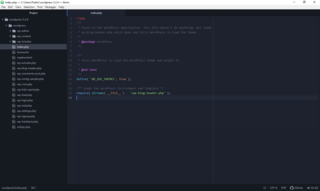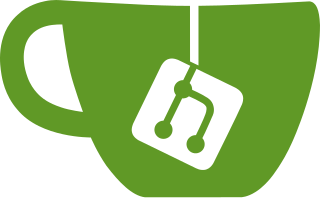
coreboot, formerly known as LinuxBIOS, is a software project aimed at replacing proprietary firmware found in most computers with a lightweight firmware designed to perform only the minimum number of tasks necessary to load and run a modern 32-bit or 64-bit operating system.
A source-code-hosting facility is a file archive and web hosting facility for source code of software, documentation, web pages, and other works, accessible either publicly or privately. They are often used by open-source software projects and other multi-developer projects to maintain revision and version history, or version control. Many repositories provide a bug tracking system, and offer release management, mailing lists, and wiki-based project documentation. Software authors generally retain their copyright when software is posted to a code hosting facilities.

Mercurial is a distributed revision control tool for software developers. It is supported on Microsoft Windows, Linux, and other Unix-like systems, such as FreeBSD and macOS.
File sharing is a method of distributing electronically stored information such as computer programs and digital media. Below is a list of file sharing applications, most of them make use of peer-to-peer file sharing technologies.

qBittorrent is a cross-platform free and open-source BitTorrent client written in native C++. It relies on Boost, OpenSSL, zlib, Qt 6 toolkit and the libtorrent-rasterbar library, with an optional search engine written in Python.

The Linux Foundation (LF) is a non-profit organization established in 2000 to support Linux development and open-source software projects. In addition to providing a neutral home where Linux kernel development can be fostered, the LF is dedicated to building sustainable ecosystems around open-source projects to accelerate technology development and encourage commercial adoption.
In FOSS development communities, a forge is a web-based collaborative software platform for both developing and sharing computer applications.

GitHub is a developer platform that allows developers to create, store, manage and share their code. It uses Git software, providing the distributed version control of Git plus access control, bug tracking, software feature requests, task management, continuous integration, and wikis for every project. Headquartered in California, it has been a subsidiary of Microsoft since 2018.

Homebrew is a free and open-source software package management system that simplifies the installation of software on Apple's operating system, macOS, as well as Linux. The name is intended to suggest the idea of building software on the Mac depending on the user's taste. Originally written by Max Howell, the package manager has gained popularity in the Ruby on Rails community and earned praise for its extensibility. Homebrew has been recommended for its ease of use as well as its integration into the command-line interface. Homebrew is a member of the Open Source Collective, and is run entirely by unpaid volunteers.

Atom is a free and open-source text and source-code editor for macOS, Linux, and Windows with support for plug-ins written in JavaScript, and embedded Git control. Developed by GitHub, Atom was released on June 25, 2015.

GitLab Inc. is an open-core company that operates GitLab, a DevOps software package that can develop, secure, and operate software. The open-source software project was created by Ukrainian developer Dmytro Zaporozhets and Dutch developer Sytse Sijbrandij. In 2018, GitLab Inc. was considered to be the first partly-Ukrainian unicorn.

DNF or Dandified YUM is the next-generation version of the Yellowdog Updater, Modified (yum), a package manager for .rpm-based Linux distributions. DNF was introduced in Fedora 18 in 2013; it has been the default package manager since Fedora 22 in 2015, Red Hat Enterprise Linux 8, and OpenMandriva, and is also an alternative package manager for Mageia.

Visual Studio Code, also commonly referred to as VS Code, is a source-code editor developed by Microsoft for Windows, Linux and macOS. Features include support for debugging, syntax highlighting, intelligent code completion, snippets, code refactoring, and embedded Git. Users can change the theme, keyboard shortcuts, preferences, and install extensions that add functionality.

Flatpak is a utility for software deployment and package management for Linux. It is advertised as offering a sandbox environment in which users can run application software in isolation from the rest of the system. Flatpak, in 2016, was known as xdg-app.

ActivityPub is an open, decentralized social networking protocol based on Pump.io's ActivityPump protocol. It provides a client/server API for creating, updating, and deleting content, as well as a federated server-to-server API for delivering notifications and content.

Gitea is a forge software package for hosting software development version control using Git as well as other collaborative features like bug tracking, code review, continuous integration, kanban boards, tickets, and wikis. It supports self-hosting but also provides a free public first-party instance. It is a fork of Gogs and is written in Go. Gitea can be hosted on all platforms supported by Go including Linux, macOS, and Windows. The project is funded on Open Collective.














